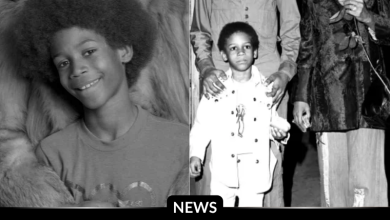“I Wrote Them for Her” — Aretha Franklin Opens Up About the 3 Songs She Wrote for Her Mother That Helped Her Heal From Childhood Trauma
OPINION: This article may contain commentary which reflects the author's opinion.
Before she was crowned the Queen of Soul, Aretha Franklin was simply a little girl searching for comfort in music. At just 10 years old, she faced a heartbreak that would shape the rest of her life — the loss of her mother, Barbara Siggers Franklin. In the years that followed, Aretha turned to the piano as both sanctuary and voice, writing three deeply personal songs that became her first expressions of grief, faith, and hope.
In later interviews, Franklin revealed that these early compositions — “My Mother’s Song,” “Never Leave Me Alone,” and “Sweetest Sound” — were not just melodies but messages.
“I didn’t know how to grieve,” she once said softly. “So I sang instead. Those songs were my way of keeping her close.”
🎵 1. “My Mother’s Song” — The Beginning of Healing
Aretha’s very first composition, written soon after her mother’s passing, was a simple hymn-like piece titled “My Mother’s Song.”
“It was mostly humming and a few words,” she recalled. “But I remember writing, ‘Mama’s in heaven, but her voice is still here.’ That was the first time I realized a song could heal pain.”
The piece, built around soft piano chords and a melody reminiscent of the gospel hymns her mother sang in church, became her private ritual.
“It was my prayer,” Franklin said. “Every time I played it, I felt like she could hear me.”
Even as her talent blossomed and her career took her from small churches to global stages, Aretha never forgot that first song — the one that taught her how music could transform sorrow into strength.
🙏 2. “Never Leave Me Alone” — From Fear to Faith
Her second song, “Never Leave Me Alone,” emerged from a more difficult chapter.
“I was angry,” Franklin admitted. “I didn’t understand why she had to go. I felt abandoned, so I wrote this song asking God not to leave me too.”
This was not a polished gospel number, but a child’s raw plea for comfort — part confession, part conversation with the divine.
Though the song was never formally recorded, Franklin later said its emotional honesty became a spiritual blueprint for her later work, especially her 1972 gospel landmark Amazing Grace.
“When I sang ‘Never Leave Me Alone,’ I wasn’t just talking to God — I was learning to forgive Him,” she explained.
The song, she said, was where she learned that faith could coexist with fear — and that both could be sung.
🌤️ 3. “Sweetest Sound” — The Dawn of Hope
By age 13, Aretha had begun to turn her pain into purpose. Her third early composition, “Sweetest Sound,” reflected a new chapter — one of acceptance and gratitude.
Her father, the famed Reverend C.L. Franklin, encouraged her to perform the song publicly during Sunday services.
“It was the first song I sang in church that wasn’t written by someone else,” she remembered. “People cried. That’s when I knew — if music could make others feel what I felt, maybe it could heal more than just me.”
That performance became a turning point. It was the moment the young girl with a broken heart began to find her voice — not just as a singer, but as a storyteller and vessel for emotion.
💖 Healing Through Her Gift
Even after her rise to superstardom with hits like “Respect,” “(You Make Me Feel Like) A Natural Woman,” and “Chain of Fools,” Aretha Franklin never forgot those first three songs. To her, they were sacred — a private conversation between mother and daughter.
“They were never about fame,” she said. “They were about survival. I was a little girl trying to find my mother — and somehow, she found me through music.”
🎙️ “Her Voice Still Lives in Mine”
In one of her final interviews, Franklin reflected on how her mother’s influence continued to shape her artistry decades later.
“Mama taught me how to sing before I could even talk,” she said. “Every note I ever sang — it was her voice coming through mine.”
Those three songs, written by a 10-year-old sitting alone at a church piano, became the foundation of one of the most powerful and enduring voices in American music.
“I didn’t just write them for her,” Aretha once said. “I wrote them to remind myself that love — real love — never dies.”
Through loss, Aretha Franklin found her voice. Through music, she found healing.
And in doing so, she gave the world more than songs — she gave it the sound of resilience, faith, and a daughter’s eternal love.



